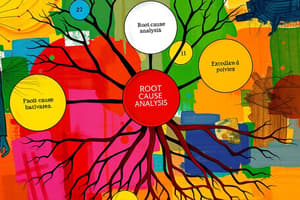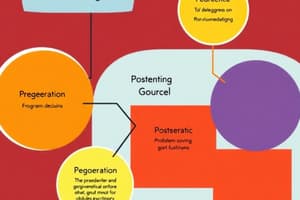Podcast
Questions and Answers
What is problem solving considered to be?
What is problem solving considered to be?
a mindset
What should you do if you never take action?
What should you do if you never take action?
never get feedback
Which of the following is a key component of the problem-solving process?
Which of the following is a key component of the problem-solving process?
- Ignore feedback
- Identify the root cause
- Develop a hypothesis
- Both A and C (correct)
What technique helps identify all the root causes of problems?
What technique helps identify all the root causes of problems?
Creating a logic tree helps list all possible __________.
Creating a logic tree helps list all possible __________.
What is the first step to tackle a problem according to the process?
What is the first step to tackle a problem according to the process?
Prioritizing actions requires deciding upon a key __________.
Prioritizing actions requires deciding upon a key __________.
Solutions should not align with your goals.
Solutions should not align with your goals.
What should you focus on when implementing a plan?
What should you focus on when implementing a plan?
When setting a specific goal, what quality should it possess?
When setting a specific goal, what quality should it possess?
How should a problem-solving approach be viewed?
How should a problem-solving approach be viewed?
Study Notes
Problem Solving Mindset
- Problem solving is a skill and mindset that involves balancing thinking and acting.
- Addressing the root cause of a problem is crucial for effective solutions.
Feedback and Growth
- Action leads to feedback, which is essential for growth as a problem solver.
- Problem-solving isn't complicated: understand the situation, identify the root cause, develop a plan, and execute.
- Every problem is unique, requiring tailored solutions by asking "why" and "how."
Logic Trees
- Logic trees help identify potential root causes of problems, ensuring a comprehensive analysis.
- Logic trees can be transformed into yes/no trees, categorizing elements for easier identification of core issues.
Hypothesis Development
- Formulate a hypothesis about the likely root cause, a hunch that requires verification.
- Testing the hypothesis with data collection and analysis helps make better decisions.
Information Gathering
- Data collection and analysis are purposeful, aimed at informing decision-making, not just gathering information.
- Unfocused research without a clear question can lead to wasted time and effort.
Analysis and Root Cause Identification
- The outcome of analysis may differ from the initial hypothesis, highlighting the importance of testing.
- Proceeding with an untested hypothesis can lead to ineffective solutions.
Solution Development
- Create a wide array of possible solutions to solve the problem with a logic tree.
- Focus on knowledge from analysis when developing solutions, guiding the process.
- Solutions should align with set goals.
Prioritization
- Establish key criteria for prioritizing actions, considering factors like ease of implementation and impact.
- Priority matrices map impact and ease of implementation, facilitating decision-making.
Implementation
- Focus on tasks with high impact and ease of implementation for efficient execution.
- Collaboration with others can leverage their strengths to address weaknesses.
Fishy Goals and Solid Achievements
- Break down large dreams into smaller, achievable goals.
- Create a plan and start working on it.
Goal Setting
- Define specific and clear goals, avoiding vagueness.
- Include specific conditions for plan implementation.
Studying That Suits You
Use AI to generate personalized quizzes and flashcards to suit your learning preferences.
Related Documents
Description
Explore the essential techniques and mindsets involved in effective problem solving. This quiz covers root cause analysis, logic trees, hypothesis development, and the importance of feedback for growth. Learn how to apply these concepts to enhance your problem-solving abilities.




